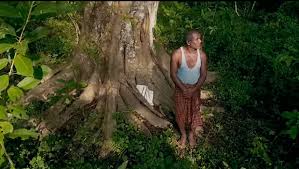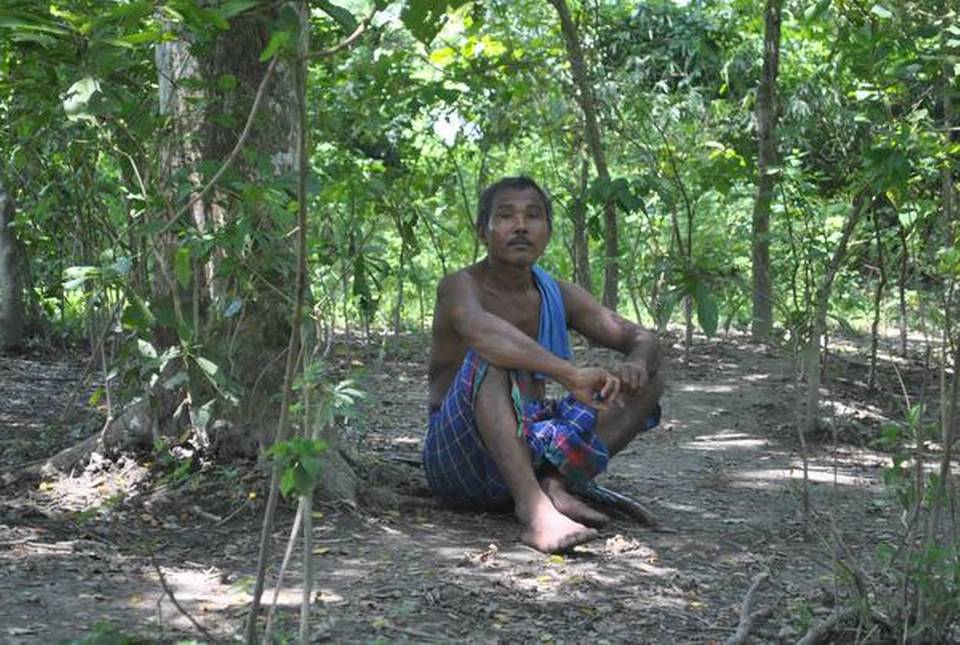Ameen Qudir
Published:2019-10-20 19:27:25 BdST
জোরহাটে বালুচরে ১,৩৬০ একর জমিকে জঙ্গল বানিয়েছেন এই মানুষটা!
ডেস্ক/
জোরহাট জায়গাটা সিলেট থেকে কাছেই। অনেকে এখন সেখানে ভ্রমণে গিয়ে গভীর প্রশান্তি লাভ করেন। আরও প্রশান্তি যাদব পায়েং নামের মহাপুরুষের সঙ্গে আলাপে। তিনি বনমহাপুরুষ। কেন! বলছি।
১৯৭৯ সাল। বন্যার জলে ভেসে বিপুল সংখ্যক সাপ এসে জমা হয় আসামের গুয়াহাটির ৩৫০ কিলোমিটার দূরে অবস্থিত জোরহাটের একটি বালুচরে। যখন বন্যার পানি অনেকটা নেমে গেল, তখন জাদব পায়েং নামের ১৬ বছর বয়সী স্থানীয় এক কিশোর খেয়াল করলো সেখানে নিথর হয়ে পড়ে আছে অগণিত মৃত সরীসৃপের দেহ। সেসময় এই বালুচরে কোনো গাছ ছিল না, ফলে প্রচণ্ড রৌদ্রতাপে মারা গিয়েছিল সাপগুলো। ছোট ছেলেটি তখন সাপগুলোর প্রাণহীন রূপ দেখে কষ্টে কেঁদে ফেলে। এতগুলো সাপ কেবল ছায়ার অভাবে মারা গেল!

পায়েং এ বিষয়ে স্থানীয় বনবিভাগকে সতর্ক করে বলে, এখানে তারা গাছ লাগানোর পদক্ষেপ নেবে কিনা। কিন্তু বনবিভাগ জানায়, অনুর্বর এই মাটিতে কিছুই জন্মাবে না। তারা উল্টো পায়েংকে সেখানে বাঁশগাছ লাগিয়ে একবার চেষ্টা করে দেখতে বলে। এ কথায় ভীষণ কষ্ট পেলেও পায়েং ঠিকই বালুচরের মাটিতে গাছ লাগায়। পায়েং জানায়, এ কাজে তাকে কেউই সাহায্য করেনি। এমনকি আগ্রহও দেখায়নি। পায়েং সিদ্ধান্ত নেয় এখানে গড়ে তুলবে বন্যপ্রাণীর আশ্রয়স্থল, যাতে প্রাণীরা সুন্দরভাবে জীবনযাপন করতে পারে। এই উদ্দেশ্যকে সফল করতে খুব অল্প সময়ের মধ্যেই সে বালুচরে এসে থাকতে শুরু করে যাতে নতুন বনভূমির বাস্তুতন্ত্র তৈরিতে পূর্ণাঙ্গ সময় কাজ করতে পারে।
পায়েং নিজ হাতে বীজ বপন করতো ও সকাল-বিকাল গাছে পানি দিত। কিছুদিনের মধ্যেই জায়গাটি বাঁশঝাড়ে রূপান্তরিত হয়। এরপর পায়েং ঠিক করলো এখানে অন্য ধরনের গাছও লাগাবে। সে বিভিন্ন গাছ সংগ্রহ করে লাগাতে শুরু করে। শুধু গাছই লাগায়নি, পরিবেশগত ভারসাম্য রক্ষা করতে ও বাস্তুতন্ত্রের প্রাকৃতিক সম্প্রীতি বাড়ানোর জন্য সেখানে পিঁপড়ার জন্ম, বাসস্থান ও বেড়ে ওঠার ব্যবস্থা করে। এর মাধ্যমে খুব দ্রুত ছায়াহীন বালুচরটি প্রাণীদের বেঁচে থাকার ও জীবনধারণের জন্য একটি উপযুক্ত পরিবেশে পরিণত হয়। অবিশ্বাস্যভাবে, যে জায়গায় পায়েং একা হাতে গাছ লাগিয়েছিল, তা ৩০ বছর পর রূপান্তরিত হয়েছে ১,৩৬০ একরের জঙ্গলে!
তার এই পদক্ষেপে এই অঞ্চলে খুব অল্প সময়ের মধ্যে বন্যপ্রাণীরা উপকৃত হয়েছে। ‘মোলাই অরণ্য’ নামে পরিচিত এই বন এখন শকুন, হরিণ, গণ্ডার, বাঘ ও হাতি সহ বিপন্ন অনেক প্রাণীর নিরাপদ আশ্রয়স্থল। এছাড়াও এখানে আসে অনেক অনেক অতিথি পাখি।
২০০৮ সালে এ অঞ্চলের আশপাশের গ্রামগুলোর মধ্য দিয়ে তাণ্ডব তৈরি করে প্রায় ১০০ বন্য হাতি মোলাই বনে প্রবেশ করার পর পায়েংয়ের এই বন সম্পর্কে আসামের বন বিভাগ প্রথম জানতে পারে। তখন সহকারী বন সংরক্ষক গুনিন সইকিয়া পায়েংয়ের সাথে দেখা করেন।

সইকিয়া বলেন, বন্য হাতি স্থানীয় যাদের বাড়িঘরের ক্ষতি করেছিল, তারা বনটি কেটে ফেলার প্রস্তাব দেয়। কিন্তু এর পরিপ্রেক্ষিতে পায়েং বলেছেন, বন কেটে ফেলার পরিবর্তে যেন তাকেই হত্যা করে ফেলা হয়। পায়েং গাছ ও বনের জীবজন্তুকে নিজের সন্তানের মতোই পালন করেন। আর আমরাও বনের ভেতর প্রবেশ করে অবাক হই। প্রায় ৩০ বছর ধরে পায়েং যে বন তৈরি করেছেন তা অন্য কোনো দেশে করলে হয়ত তাকে বীরপুরুষ খেতাব দেয়া হতো।
তথ্য সূত্র, বাংলাকরণ : ইনহ্যাবিটেট , কলকাতা ও গুয়াহাটির মিডিয়া প্রমুখ।
Meet Jadav Payeng, India's Forest Man, who created 550 hectares of forest single-handedly
Akila Kannadasan
“When I was a little boy, a man looked at my palm to read it,” says Jadav Payeng. “He said that my life will take the course of Nature.” There may or may not be truth in palm-reading, but the prophecy came true.
Jadav went on to plant saplings and seeds along a dry sandbar by the Brahmaputra in Assam, creating a forest that stands at 550 hectares today on the island of Majuli near Jorhat. He is known as the ‘Forest Man of India’, a moniker that was conferred on him in April 2012 by Jawaharlal Nehru University.

He tells us his story when we meet in Coimbatore earlier this year, where he was visiting to inaugurate an afforestation initiative. Jadav has been planting saplings since 1979.
Majuli, the world’s largest river island, was flooded as usual by the Brahmaputra during the monsoon that year. Around July, the teenaged Jadav saw something that would change his life. “I saw hundreds of snakes that were washed up during the floods, lying dead on the sandbar in the heat once the water dried up.”
He wondered what it would look like if the same thing happened to humans — the island was being eroded at an accelerated pace.
“I asked tribal people in a nearby village what I could do and they said that I should plant trees, bamboo in particular, since it could withstand harsh conditions,” recalls the 60-year-old. “They gave me 25 saplings and some seeds too.”
What Jadav did on that hot day, driven by something that tugged at his heart and scared him in equal measure, would win him global recognition a few years later.
Jorhat-based freelance journalist and wildlife photographer Jitu Kalita wrote about Jadav in Assamese newspaper The Dainik Janambhumi in 2010, leading to hundreds of stories in various publications in the years that followed, as well as numerous documentary films on him. People travel from across the globe to see his forest that is visited by 120 species of birds, including migratory ones; and elephants, rhinos, and tigers that visit from Kaziranga National Park.
Jitu tells us that a herd of 50 to 150 elephants remains in the forest for nearly three months a year. Locals call it ‘Mulai forest’; Mulai is Jadav’s nickname.
“I stopped going to school,” says Jadav, speaking of the 1970s. It was a practical decision. For he was getting obsessed with his vision and thought of nothing else. Marriage came late too. “I was 42 when I got married,” he says. “I thought about settling down only late in life.” He has two sons and a daughter, and makes a living from selling milk from his cows and buffaloes that graze within his forest.
In fact, Jadav has lost several of his cows to tigers so far, and is unaffected by it. He waves his hand, saying, “They see cattle as food.” Jadav, who is from the Mishing tribal community, plans his tree plantings according to the arrival of the monsoons. “I plant in April, May, and June, so that they can benefit from the rains,” he explains. “During the rest of the nine months, I collect seeds from within the forest.”
Expanding his forest is not as difficult as it used to be now, since Nature does a bulk of the work. But there’s one threat that Jadav deals with every day: man. He knows poachers have an eye on his forest and its inhabitants, which is why every time he has to travel somewhere, he requests the local Forest Department authorities to keep an eye out for him.
Meet Jadav Payeng, India's Forest Man, who created 550 hectares of forest single-handedly
Jadav has a simple solution to the global problem of depleting forest cover: teach our children to love Nature. “The rest will happen on its own,” he feels. Although he fears for his forest’s safety, he knows it will survive. The trees he walks past every day talk to him. “They call out to me, saying ‘Come, come, now; enough of walking in the sun. Sit under our shade and rest a bit’,” he says.
But he never listens.
আপনার মতামত দিন:









